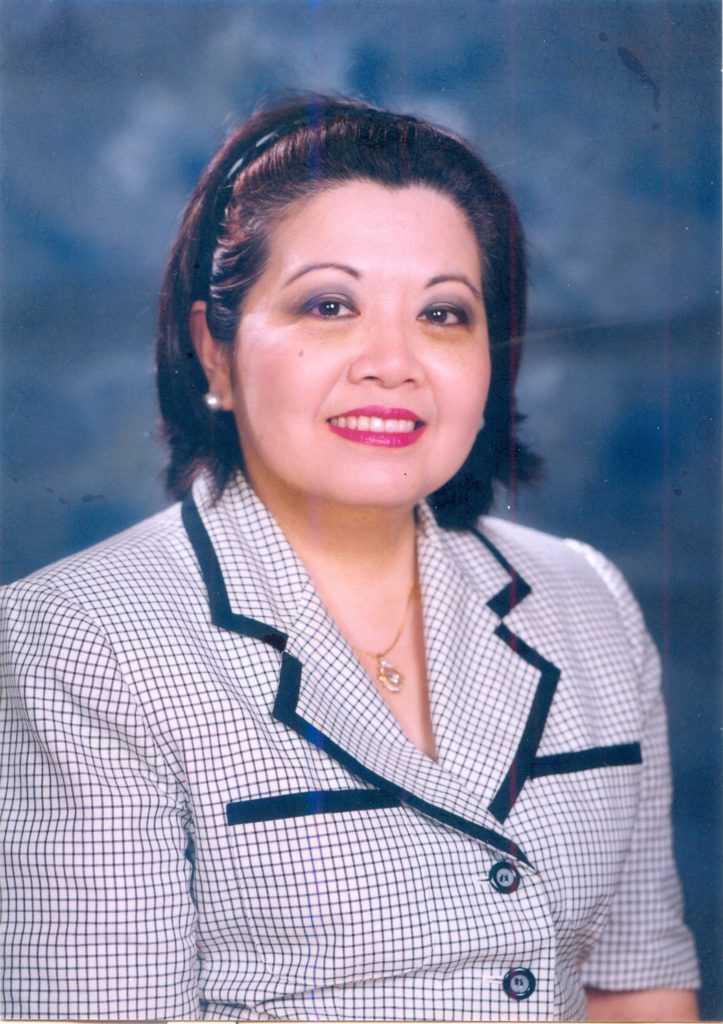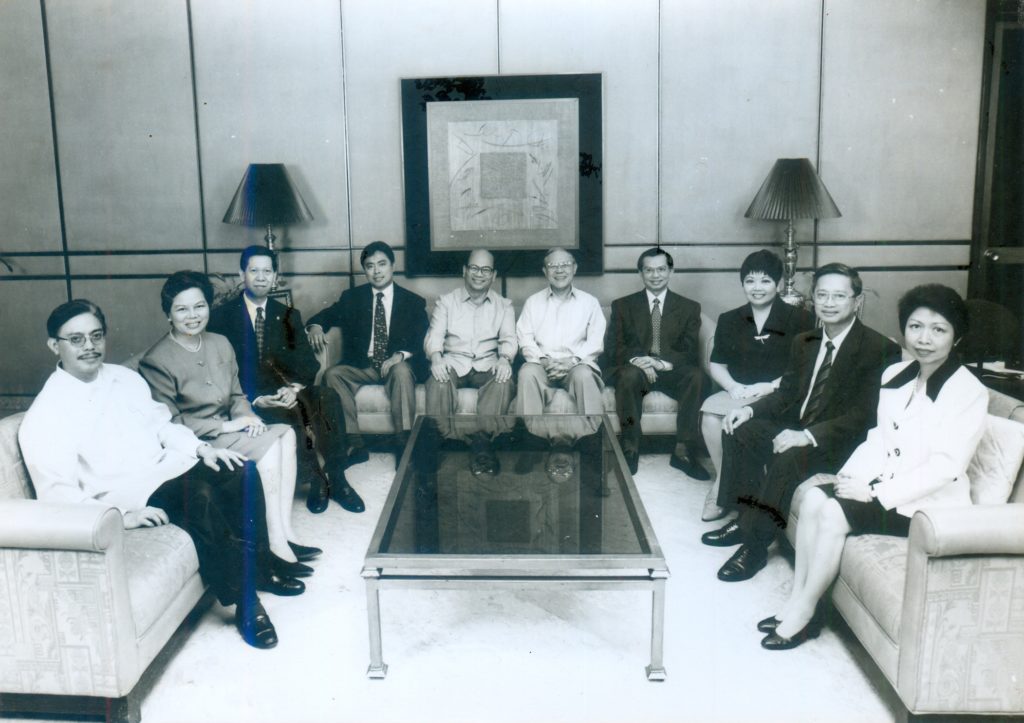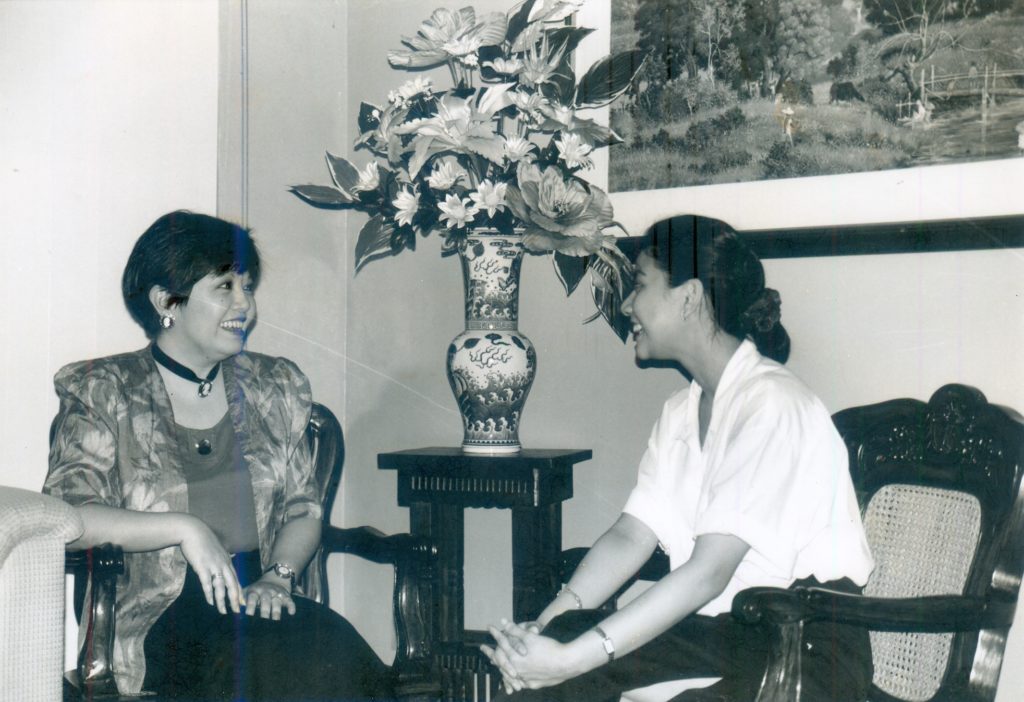(This article was first published in Universitas at the second quarter of 1998.)
June celebrates the centenary of the Philippine Revolution. Filipinos everywhere remember the glory and the pain that was 1898.
Even UA&P people are walking down memory lane. They try to capture the nostalgia and the joy of that year. However, at the office of the new Managing Director for Finance, a lady works quietly on her orderly table. She seems oblivious of the festivities. Yet, after a brief conversation with her, one discovers that she has been following the centenary celebration more closely than one might think. A picture on her table tells her story.
It is the photograph of Cora Aseniero and her husband, Joselito, whose grandfather was one of Jose Rizal’s students when he was in Dapitan. Rizal’s influence during that exile was so great that they all became important people in their own right. Jose, Joselito’s grandfather, became the first governor of Zamboanga. Joselito, in turn, became a successful businessman; he married Cora Bernardo, who has been at the frontline of our academic community for 10 years.

Mrs. Aseniero, UA&P’s new Managing Director for Finance, exudes the strength and loyalty that make a hero. When one gets down to it, being a wife-mother-executive can be herculean indeed. Still she affirms that the role of the women as homemakers is very important. She recalls that the women during the revolution stayed home and took care of their families. However, they were doing a very important role as the “support staff.”
“Undoubtedly, the Philippine independences would not have been possible were it not for the heroism of countless revolutionary women, many of whom were young at the time of the uprisings. The mothers and wives of the Philippine revolution possess courage, patience, love, humility, and perseverance in immeasurable quantity. While they were giving birth, nursing babies, caring for their children, and burying their dead, they were also feeding and treating the wounded, guarding secret documents, and passing delicate messages. These women instilled in their sons’/husbands’ hearts values that helped the revolution succeed. These are love for freedom, bravery, concern for the motherland, fortitude, quest for the truth. I would like to think that men and women have different roles to play, both equally important and complementary.” Involvement in educating tomorrow’s leaders through UA&P makes her your sort of Teodoro Alonso in a, so to speak, Armani suit.
Besides her new job, she is also the College Secretary of the College of Arts and Sciences (CAS). She jokes that having two positions at the same time seems to be the story of her life since she came to the University. She joined CAS in 1989 as an Administrative Manager. Two years later, she was appointed Business Manager, while retaining her former position. Two years after, she was appointed Vice President for Administration of the entire University concurrent with her positions in CAS. She became College Secretary in 1995.

As Managing Director for Finance, she has no plans of creating new policies to suit her needs. Rather, she wants to strengthen existing policies and standard operating procedures by implementing them.
“We can make many policies, but if they are not implemented, it’s as good as if we did not have them,” she quips. “Policies and procedures are already in place but sometimes they are not consistently applied. And usually, when they are not followed, we have some problems.”
She believes that cost effectiveness, and not cost control, contributes to financial discipline. “It is very important to remember that the University has many concerns: scholarship grants for students, faculty development, facilities and campus involvement, salary upgrade. Thus, when we spend, we must consider its impact on the overall interests of the University.”
She believes that an effective worker must have order, focus, decisiveness, discipline, and good assistants. She cannot work with a cluttered table; she must first put things in order to be able to work.
“I think order is very important, whether it is physical order or mental order, that is, in our minds, it should be clear what our priorities are. It is important to focus on the particular job or subject by harnessing all information and knowledge about it so that the right decision is made. Once we have thought out what needs to be done, and after considering its impact on human, material, and capital resources, we have to be decisive. Discipline is also important so that you are able to work fast and really finish what you have started. I am also lucky to have good assistants who are driven, competent, and responsible. I will not be able to do as much without them.”

Her secret? Time-saving techniques. She memorizes papers, sometimes even the salaries of her employees, so that she does not have to go back to files. It’s her way of fighting the ravages of time. “I have to start doing that, otherwise I will end up as forgetful as my grandmother. It’s true when age catches up (on) you, there will be moments when you will be forgetful.”
Tackling her now role, she has set her plans for the University. She hopes that one day it will be “financially viable” so that it can upgrade the campus facilities without agonizing through the usual process of justifying the expense. She hopes that UA&P can improve the standards of living of its constituents through competitive salaries and relative benefits. She also hopes to grant as much as 10%-15% scholarships to deserving students and to set aside funds for the University’s expansion in Canlubang.
As for the Accounting and Finance Unit, she wants to see its full computerization. “I would like to improve the service that AFU is giving to all the other units. And we would like to support them efficiently and effectively. But we can only do that if we are fully computerized. Remember that the two accounting offices from CAS and the main accounting office have merged since June (1997) and they had different accounting systems which were not really 100% computerized. We have to integrate that and then come up with an accounting computer system that can address the needs of the University.” She also wants all UA&P units to plan their activities thoroughly and come up with a well thought-out budget that is carefully and faithfully implemented. If this done, at the end of the year, income statements showing the actual revenues and the actual expenses are almost the same “plus or minus a few thousand pesos only.”
She plays the role of an efficient purse holder at home as well.
“We should never equate money with power because it does not mean that just because you have money, you ought to spend it. It is good to have collegiality, be it in the office or in the family, as regards major financial decisions. I would like to think that handling money matters is a service I give to others.”
With her hectic schedule, she makes sure that she gives her family quality time. She does her errands, the grocery, and runs to the drugstore and to the dry cleaners after work. She does not have any particular hobby. Occasionally she goes out with her two closest friends for lunch or to see a movie or even a play. Her hobbies are built around her husband’s. He is an audiophile who loves to listen to operas and is a classic car restorer.
With all her achievements, Mrs. aseniero is quick to admit that her talents are God-given, otherwise she would not have been able to accomplish all of them. She has another special secret: an “invisible secretary.”
“My guardian angel. I talk to him. I review my work for the day and I ask him for reminders. Sometimes I forget something, but all of a sudden I remember.”
March 1999 will mark Mrs. Aseniero’s 10th years anniversary in UA&P. She hopes that all her plans have been fulfilled by the turn of the century. With values learned from our national hero, and a faithful “secretary” backing her up, she is certainly on her way to achieving her goals.
Know more about the University of Asia and the Pacific here.
Leave a Reply